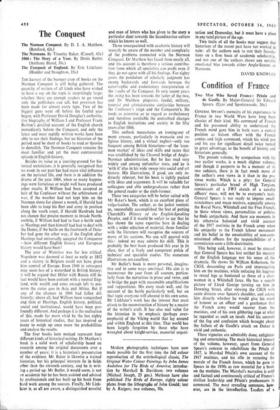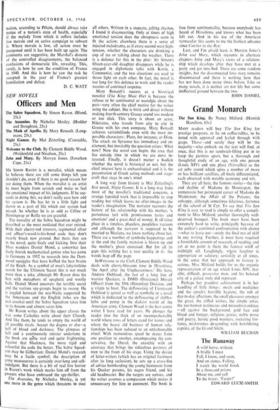Two Men Who Saved France: Main and de Gaulle. By
Major-General Sir Edward
Condition of France
Spears. (Eyre and Spottiswoode, 30s.) GENERAL SPEARS'S memoirs of his experiences in France in two World Wars have long been classics of their kind. His command of French and his presumed ability to understand the French mind gave him in both wars a central position as liaison officer with the French armies and high command, which his vivid pen and his eye for significant detail twice turned to great advantage, to the benefit of history and historians generally.
The present volume, by comparison with his two earlier works, is a much slighter volume; and though it purports to be a memoir of its two subjects, there is in fact much more of the author's own views in it than in the pre- vious works. Which is a pity: for General Spears's particular brand of High Toryism, reminiscent of a TW3 sketch of a cavalry officers' mess, will not be to everyone's taste. General Spears is too ready to impute small- mindedness and mean motives, especially among the Royal Navy, Whitehall and the Free French, to those whose views, personalities or policies he finds antipathetic. And there are moments in his otherwise balanced and vivid account of the 1917 mutinies in the French army when his antipathy to the French labour movement and his belief in the unsuitability of non-com- missioned officers for the responsibilities of a commission seem a little doctrinaire.
This being said, however, it must be stressed that General Spears has lost neither his mastery of the English language nor his sense of. the dramatic. He shows Sir William Robertson, the CIGS, descending on Paris and interrogating him on the mutinies, while unlacing his leggings to reveal legs as bunioned as those of a char- woman in a Whitehall farce. He has a superb picture of Lloyd George turning on him in Downing Street, after viewing the CIGS with acute distaste over Spears's shoulder, and asking him directly whether he would give his word of honour as an officer and a gentleman that the French army would recover from the mutinies, and of his own gibbering rage at what he regarded as such an insult. And his account of the fog and confusion which brought about the failure of de Gaulle's attack on Dakar is vivid and authentic.
These vignettes are admirably done, enlighten- ing and entertaining. The main historical interest of the volume, however, apart from General Spears's concern to rehabilitate the Main of 1917, is Marshal Main's own account of the .1917 mutinies, and his role in restoring the morale of the French forces, which he gave to Spears in the 1930s as raw material for a book on the mutinies. The Marshal's narrative is cold and factual and continuously critical of France's civilian leadership and Pdtain's predecessors in command. The most revealing sentences, how- ever, are in the introduction. Leaders of a nation, according to Main, should always take notice of a nation's state of health, especially if the malady from which it suffers includes low morale and an active campaign to subvert it. Where morale is low, all action must be postponed until it has been built up again. The comments are suggestive, the Marshal's distaste of the controlled disagreements, the balanced confusions of democratic life, revealing. This, surely, is how he saw the condition of France in 1940. And this is how he saw the task he accepted in the year of France's greatest humiliation and defeat.
D. C. WATT







































 Previous page
Previous page